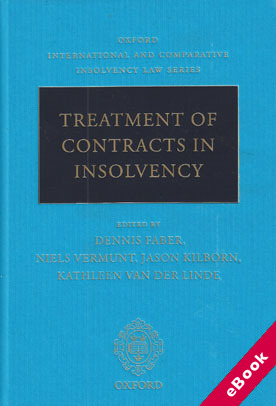
The device(s) you use to access the eBook content must be authorized with an Adobe ID before you download the product otherwise it will fail to register correctly.
For further information see https://www.wildy.com/ebook-formats
Once the order is confirmed an automated e-mail will be sent to you to allow you to download the eBook.
All eBooks are supplied firm sale and cannot be returned. If you believe there is a fault with your eBook then contact us on ebooks@wildy.com and we will help in resolving the issue. This does not affect your statutory rights.
This is the second title in the new 'Oxford International and Comparative Insolvency Law Series'.
Virtually any insolvency needs to deal with the matter of contractual obligations and this book focuses on the extent to which insolvency law interferes with those obligations and relationships.
As with the first volume in the series, the topic is addressed through national reports from at least twenty of the main economically developed countries, all of which follow a uniform structure. This format enables easy comparison between the jurisdictions and substantially enhances the accessibility of material on a jurisdiction to foreign lawyers.
It is essential for all commercial lawyers to consider the implications of insolvency (whether of their client or of the counter-party) on any contract that is under discussion, particularly where there are international aspects to the transaction.
This work provides authoritative guidance on the consequences of insolvency on the contractual relationship covering issues such as performance, rights of counterparties, and the special treatment of nominated contracts. Also considered are the effects of pre-insolvency negotiated contractual remedies such as flip clauses, automatic termination, acceleration clauses, close out netting provisions, flawed/conditional rights and penalty provisions.
The book takes a comparative approach to the treatment of restitution claims and contracts concluded during the proceedings by the insolvency administrator. There is also guidance given on striking a balance between competing interests in an insolvency situation, for example social concerns raised by some employment contracts.
Quality, uniformity and the high level of detail of National Reports are the key benefits of this book. The topic of the treatment of contracts is one in which there are significant differences internationally making this volume a valuable reference tool for practitioners and scholars alike.